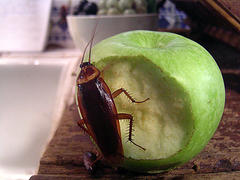Make Roach Pest Control a Priority
 Cockroaches are one of the most common insect pests in houses and apartment buildings. They are also one of the most hated. Who wouldn’t cringe at the sight of dozens of roaches quickly scurrying away when a light is turned on in the kitchen? And our distaste is well-founded. Cockroaches carry and spread a number of health problems. Find out more, including effective roach pest control measures.
Cockroaches are one of the most common insect pests in houses and apartment buildings. They are also one of the most hated. Who wouldn’t cringe at the sight of dozens of roaches quickly scurrying away when a light is turned on in the kitchen? And our distaste is well-founded. Cockroaches carry and spread a number of health problems. Find out more, including effective roach pest control measures.
About Roaches
What we think of as the common cockroach actually comprises a number of different insect species. There is even a kind called periplaneta Americana, or the American cockroach -- a misnomer, since this kind of roach is to be found worldwide. Depending on their type, adult roaches may range in size from 10-40 mm, or approximately 1/3 to 1 1/2 inch.
Roaches are active mainly at night, when they tend to have free run of your kitchen. During the day, they prefer to hide, preferably in warm moist spaces, but they will take up residence in cracks in your bathroom wall, your home heating system, electrical appliances, and more. If you live in an apartment, they will move freely among the neighbors in your building.
Cockroaches aren’t overly picky eaters. Though their favorite foods are full of starch and sugar (think pastries and candy), they also enjoy such delicacies as cardboard, shoe soles, blood and sputum, and the dead or weak from among their own kind.
Why Roaches Are Dangerous
Roaches aren’t considered pests just because of their yuck factor. Via their gland secretions and their vomit (eeww!!) they give off an unpleasant odor that is extremely hard to get out of your home. They can also damage household possessions ranging from upholstered furniture to hardbound books.
Worse than those unpleasant habits, though, is their infamous “calling card.” In their wake, roaches leave feces and partially digested food. Because they eat garbage and human waste, they pick up disease organisms and parasitic worms. They then spread these by means of the digestive fluids which they leave behind on foods they have nibbled. What’s more, they transfer additional microbes via the numerous hairs on their bodies.
As well as causing allergic reactions including skin conditions and respiratory problems, roaches are known to carry dangerous diseases such as cholera, diarrhea, dysentery, leprosy, plague, polio, and typhoid fever.
How to Prevent Roaches
Cleanliness is the first step in a roach prevention program. Keep your kitchen tidy and never leave dirty dishes lying around. Leftover food should be put away in the fridge promptly. Non-perishables like grains are best stored in tightly closed bug-proof containers. Cover your kitchen trashcan, empty it often, and occasionally rinse it with a bleach solution.
Shop for your food at stores you trust to be clean, and check your grocery bags for roaches before you bring them into your house. Do the same for items like secondhand clothing or used furniture.
Seal any places where cockroaches may be coming into your home, for example, a hole in your doorframe or the opening for your sewer pipes. Make sure that there is no standing water on your premises.
How to Get Rid of Roaches
If your home has already been invaded by cockroaches, you will need some serious pest control measures. A moderate infestation of roaches can usually be taken care of with traps or bait. However, a major roach problem will respond best to chemical treatment. Are you thinking, “I need professional pest control near me to solve this problem,” you can be assured that Networx has a variety of exterminators who excel at roach removal. One or more follow-up treatments will generally be necessary to ensure that all the roaches and their eggs have been successfully eradicated. Control of roaches in an apartment building requires cooperation of all the tenants.
Laura Firszt writes for networx.com.
Looking for a Pro? Call us (866) 441-6648

Pest control Average Costs
Exterminators Experiences

The Best Pest Control Service For My New Florida Home

Pest Control Got Rid Of Bedbugs From A "Bargain" Headboard



